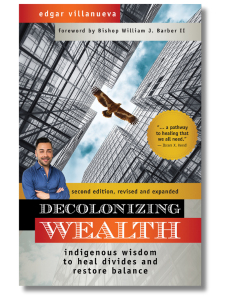Many of us are familiar with the term decolonization, even if we don’t know exactly what it means. There are calls to decolonize different aspects of our everyday lives — from decolonizing our diets and bookshelves to our healthcare systems and our minds. To better understand this term, we need to recognize how colonial dynamics are baked into pretty much all of our institutions.
Edgar Villanueva, expert on social justice philanthropy and author of Decolonizing Wealth, uses the term “colonizer virus” to describe how the negative ideas that come with colonization still impact people and institutions today. Even though the conquest phase of colonization is over, the ideology remains. Like a virus, this colonizer mindset adapts and is passed down over generations, urging us to “divide, control, and exploit.”
What exactly is decolonization?
 Villanueva states that decolonization, taken literally, would mean that the stolen land is returned, and sovereignty over the land and its resources — as well as over social structures and traditions — is granted back to those from whom it was all stolen.
Villanueva states that decolonization, taken literally, would mean that the stolen land is returned, and sovereignty over the land and its resources — as well as over social structures and traditions — is granted back to those from whom it was all stolen.
He also acknowledges that such a definition of decolonization would make no headway. A future that doesn’t include settlers occupying Indigenous lands isn’t feasible. While we can’t undo what has already happened, we can approach decolonization through the lens of stopping the cycle of abuse and healing ourselves from the trauma of colonization. We can all play a part in this process by identifying and rejecting the colonized aspects of our culture and embracing a paradigm of connection.
In Decolonizing Wealth, Villanueva offers a seven-step method for healing from the trauma of colonization. The seven steps — Grieve, Apologize, Listen, Relate, Represent, Invest, Repair — help heal the layers of exploitation. This process is not a quick fix: it requires participation and patience from all of us, but it can ultimately help restore balance and make room for a new future.
How the colonizer virus creates a dysfunctional workplace culture
The colonizer virus shapes many of our institutions, and the workplace is no exception. Corporations were initially invented to be tools to efficiently colonize nations. Colonization views people as resources to be exploited, and it’s no surprise that so many of our organizations have a similar approach.
Have you ever felt compelled to respond to emails immediately, even when the issue at hand wasn’t actually time-sensitive? Were you taught to always keep hustling and striving for the next goal? Are you tired of seeing job descriptions that glorify working in a “fast-paced environment?”
So many of these traits that we take for granted — such as urgency culture, perfectionism, defensiveness, competitiveness, and power-hoarding — result from the colonizer virus. It’s not by accident that our organizations are like this.
Organizational design determines how power is distributed, how decisions are made, and how success is measured. So far, many of our workplaces have been based on colonial dynamics, which lead to separation, hierarchy, and power-hoarding. Similar to how colonizers extracted land and resources from Indigenous people, current organizational structures allow people at the top to consolidate power, exploiting the labor and skills of the bottom majority. Workers are seen as disposable, which is why layoff culture is so common. Once we realize how colonization shapes our organization, we can reject such dynamics and consciously work towards a different design. Check out our July 11th talk with Villanueva on transforming organizations through Indigenous values to learn more.
How to get started decolonizing your workplace
When it comes to the workplace, there are shifts that we can take to decolonize our leadership approach and organizational culture.
Unlike what the hierarchical leadership models based in colonial dynamics suggest, we all have the potential to lead and influence our organizations. The personal and structural are intertwined, and as we do the work of decolonizing ourselves, we can start to have a ripple effect. In Black Fatigue, author Mary-Frances Winters talks about how we can practice “Decolonization of the mind” by resisting “settler state” norms and turning towards Indigenous values. This process can include focusing on interdependence instead of individualism, and centering change over comfort.
Urgency culture — influenced by a colonial mindset that sees people as resources — is prevalent in so many of our organizations. Have you ever worked through the weekend or while sick to meet a deadline, only to find out that the task could have easily been pushed out? I’ve definitely been there, and it’s frustrating to see how artificial this sense of urgency can be. Deadlines and swift responses can be important, but not everything requires urgent handling.
I’d been taught to respond to requests ASAP, and so was amazed when I saw people actively resisting this mindset. One client that I worked with included a note in her email that assured others that while she would respond, she didn’t buy into urgency culture and might take a few days. I think it would be helpful to adopt such an approach and to realize what is time sensitive and what can wait. We can honor our humanity by giving ourselves and others some margin, taking our sick days when needed instead of pushing ourselves past the brink of exhaustion, and realizing that a lot of deadlines can actually be moved without the world ending.
Colonial dynamics also encourage perfectionism and rigidity. This mentality makes it hard to admit mistakes and engage in work that doesn’t guarantee that we’ll get it right the first time. We can turn to Indigenous values and learn how to practice humility instead, which can make more space for growth and take away the stress of always having to do everything perfectly. It’s important for leaders to model that it is safe to make and admit mistakes instead of being defensive.
Unlike what capitalism and colonization would like us to believe, we aren’t separate from one another. Many organizations offer individual-focused solutions to address burnout without looking at the root causes. While yoga classes and meditation apps can be helpful, they aren’t a substitute for a systemic approach. Our well-being is interlinked. We can create a healthier culture by focusing on interdependence over individualism, addressing systemic issues and examining our policies, and developing a sense of community. If you’re interested in learning more actionable ways to put this into practice, I’d recommend that you check out the Self to Systems Training Course, which offers strategies and frameworks for dismantling oppression in organizations.
Staying committed to the process
The more we identify the ways that the colonizer virus shapes our institutions, the more effectively we can come up with alternative and healthier ways of working, organizing, and living.
Colonization has a long history, and unlearning and undoing such dynamics will take time. It’s possible to decolonize ourselves and our organizations. We can lean into the discomfort instead of running away from it. We can learn to grieve and apologize, to lead with compassion, and ultimately to heal.




